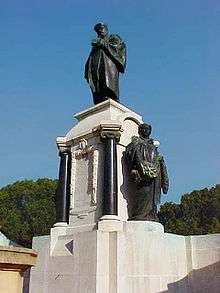Education in Karnataka

The state of Karnataka in India has institutions like the Indian Institute of Science, Indian Institute of Management, the National Institute of Technology Karnataka, Indian Institute of Information Technology, Dharwad and the National Law School of India University. In addition, a Visvesvaraya Institute of Advanced Technology (VIAT) is being constructed in Muddenahalli.[1]
As per the 2011 census, Karnataka has a literacy rate of 75.36% with 82.47% of males and 68.08% of females in Karnataka being literate.[2]
Primary and Secondary Education

As of March 2006, Karnataka has 54,529 primary schools with 252,875 teachers and 8.495 million students.[3] Likewise, there are 9,499 secondary schools with 92,287 teachers with 1.384 million students.[3] There are three kinds of schools in Karnataka viz. government (run by the government), aided (financial aid is provided by the government) and un-aided private (no financial aid is provided). In majority of these schools, the medium of instruction is either English or Kannada. The syllabus taught in the schools is either of CBSE, ICSE, NIOS or the state syllabus (defined by the Department of Public Instruction of the Government of Karnataka).[4] The curriculum includes subjects like science, social studies and mathematics apart from language related subjects. In order to maximize attendance in schools, the Karnataka Government has launched a midday meal scheme in government and aided schools in which free lunch is provided to the students.[5] At the end of the secondary education, the students pursuing the state syllabus have to pass an examination called as SSLC to move on to the next level.
Pre University Education
Students who have passed SSLC have to pursue a two-year Pre university course (PUC) or a three-year diploma course before they are granted admission to a degree (baccalaureate) college. In the pre university course, the student has to choose one among the three streams of Arts, Commerce and Science depending on the kind of degree the student wants to pursue later.[6] The Arts stream includes subjects like History, Sociology and Political Science, the Commerce stream includes subjects like Accountancy, Economics and Business Mathematics and the Science stream includes subjects like Physics, Chemistry, Mathematics and Biology.
International Schools & Certification Boards
Bengaluru is one such city in India that caters to the needs of prospective parents seeking International education for their children. Bengaluru has evolved into one of the global education hubs due to its cosmopolitan crowd. Most of International Schools follow IB (international baccalaureate, Geneva) or Cambridge (Cambridge International Examinations, Britain) curriculum.Where as ICSE and CBSE are the Indian curriculum followed by most of the Indian schools in Karnataka.
These international schools focus more on the holistic education & inquiry based learning for their students than just focusing on rote-learning.
Baccalaureate education
There are a total of 481 degree colleges that are run under the jurisdiction of the universities in the state viz. Bangalore University, Kuvempu University, Mysore University, Mangalore University, Gulbarga University and Karnatak University.[7] Deemed universities such as Christ University, Manipal University also exist. Apart from these universities, there is also the Visvesvaraya Technological University which oversees many of the engineering colleges in the state. The medical colleges in the state are run under the jurisdiction of the Rajiv Gandhi University of Health Sciences. Some of these baccalaureate colleges are accredited with the status of a deemed university which grants them independence in chalking out their own syllabus and awarding degrees on their own. There are 123 engineering, 35 medical and 40 dental colleges in the state.[8]
The state has two universities offering courses related to agriculture. They are the Universities of Agricultural Sciences, Dharwad and University of Agricultural Sciences, Bangalore. The state also has set up a Karnataka Veterinary, Animal and Fisheries Sciences University at Bidar.
Other universities established by the state government are Kannada University, Karnataka State Open University, and Karnataka Women University.
There is Manipal University which is run on private basis .Karnataka has many deemed universities like NITK, NIHMANS etc.
Technical Education
The first engineering college(UVCE) in Karnataka was started by the then Diwan of Mysore Sir M. Visvesvaraya in 1917 in Bengaluru. It was the fifth engineering college to be started in the country.[9] By 1956, Karnataka had two Government and three private engineering colleges in the state.
Notes
- ↑ "An emerging educational hub". The Hindu. Chennai, India. 2009-09-07.
- ↑ "Literacy in Karnataka". Census India. Retrieved 2016-07-14.
- 1 2 "Number of schools in Karnataka as of 31-03-2006" (PDF). Online webpage of the Department of Public Instruction. Government of Karnataka. Retrieved 2007-06-06.
- ↑ "Only State syllabus students can participate in DPI sports meet". Online Edition of The Hindu, dated 2006-08-31. Chennai, India: 2006, The Hindu. 2006-08-31. Retrieved 2007-06-06.
- ↑ "Mid-day meal scheme extended". Online Edition of The Times of India, dated 2007-05-16. © 2007 Times Internet Limited. 2007-05-16. Retrieved 2007-06-06.
- ↑ "Students, parents throng PU colleges in city". Online Edition of The Hindu, dated 2006-05-16. Chennai, India: © 2006, The Hindu. 2006-05-16. Retrieved 2007-06-06.
- ↑ "Districtwise and Universitywise degree college statistics for 2006-07" (PDF). Online webpage of the Department of Collegiate Education. Government of Karnataka. Retrieved 2007-06-06.
- ↑ "CET brochure 2009" (PDF). Online webpage of the Common Entrance Test Cell. Government of Karnataka. Retrieved 2007-06-06.
- ↑ "UVCE plans year-long celebrations". Deccan Herald. 13 September 2010. Retrieved 16 December 2010.
External links
- Indian Institute of Science
- CET Karnataka Entrance
- NITK Surathkal
- Mangalore University
- Bangalore University
- VTU
- Rajiv Gandhi University of Health Science
- Manipal University
- Centre for the Study of Local Cultures
- University of Agricultural Sciences, Dharwad
- Gulbarga university
